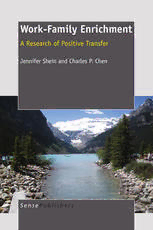
Work-Family Enrichment: A Research of Positive Transfer PDF
Preview Work-Family Enrichment: A Research of Positive Transfer
Work-Family Enrichment Work-Family Enrichment A Research of Positive Transfer Jennifer Shein Charles P. Chen University of Toronto, Canada SENSE PUBLISHERS ROTTERDAM/BOSTON/TAIPEI A C.I.P. record for this book is available from the Library of Congress. ISBN: 978-94-6091-380-8 (paperback) ISBN: 978-94-6091-381-5 (hardback) ISBN: 978-94-6091-382-2 (e-book) Published by: Sense Publishers, P.O. Box 21858, 3001 AW Rotterdam, The Netherlands http://www.sensepublishers.com Printed on acid-free paper The cover photo was provided by Sophia Rui-Ying Chen All Rights Reserved © 2011 Sense Publishers No part of this work may be reproduced, stored in a retrieval system, or transmitted in any form or by any means, electronic, mechanical, photocopying, microfilming, recording or otherwise, without written permission from the Publisher, with the exception of any material supplied specifically for the purpose of being entered and executed on a computer system, for exclusive use by the purchaser of the work. TABLE OF CONTENTS 1. Introduction.........................................................................................................1 Interest in the Work-Family Interface...............................................................1 Role Conflict: Scarcity and Depletion...............................................................1 Role Accumulation: Synergies Exist and should be Explored..........................2 A Metatheory: Donald Super’s Life-Span, Life-space Approach.....................3 Current Investigations of the Positive Side of the Work-family Interface........4 A New Theoretical Model and a Valid Global Measure of Enrichment...........5 Rationale for Qualitative Research on Work-family Enrichment......................6 Rationale for Studying Senior Managers...........................................................6 The Current Study.............................................................................................7 2. Theoretical and Empirical Foundation................................................................9 Super’s Life-span, Life-space Approach and the Life-career Rainbow.............9 Previous Research on the Benefits of Combining Work and Family Roles...............................................................................................11 A Theoretical Model of Work-family Enrichment..........................................24 A Valid Global Work-Family Enrichment Scale.............................................28 Statement of the Research Questions..............................................................30 3. Research Approach............................................................................................33 Qualitative Methodology.................................................................................33 The Critical Incident Technique......................................................................35 Participants......................................................................................................38 Demographic and Contextual Information....................................................39 Procedures.......................................................................................................40 Data Analysis..................................................................................................41 4. Role Salience Trends, Quality of Life, and the Elaborated Model....................47 Role Salience: General Trends........................................................................47 How Multiple Roles Improve Quality of Life.................................................47 Personal Growth and Development...............................................................48 Stimulation/Challenge...................................................................................49 Accomplishment/Achievement.....................................................................50 Variety and Balance......................................................................................50 An Elaborated Theoretical Model of Work-family Enrichment......................51 Resources......................................................................................................52 Affect............................................................................................................52 Performance..................................................................................................52 The Feedback Phenomenon..........................................................................53 The Process: The Three Empirically Demonstrated Pathways to Enrichment..............................................................................................53 The Instrumental Pathway.............................................................................53 v TABLE OF CONTENTS The Affective Pathway..................................................................................58 The Mixed Pathway......................................................................................62 5. Categories of Resources....................................................................................67 Skills and Perspectives....................................................................................67 Interpersonal Skills and Perspectives............................................................67 Performance Management Skills/Perspectives..............................................68 Effective Work Habits...................................................................................70 Coping Skills/Perspectives............................................................................71 Values...........................................................................................................72 Psychological Resources.................................................................................72 Motivation.....................................................................................................72 Confidence....................................................................................................72 Social Capital..................................................................................................73 Support..........................................................................................................73 Information....................................................................................................73 Material Resources..........................................................................................73 Salary/Compensation....................................................................................73 Flexibility........................................................................................................73 Work-provided Flexibility.............................................................................73 6. Categories of Positive Affect.............................................................................75 Non-facilitative Affect.....................................................................................75 Confidence/Self-worth/Empowerment..........................................................75 Happiness/Satisfaction..................................................................................77 Role Fulfillment............................................................................................77 Emotional Balance........................................................................................78 Self-actualization..........................................................................................80 Gratitude........................................................................................................80 Non-descript Positive Mood..........................................................................81 Facilitative Affect............................................................................................81 Energy...........................................................................................................81 Capability......................................................................................................83 Satisfaction....................................................................................................85 Stress Reduction............................................................................................86 7. Categories of Performance Improvement..........................................................89 Major Higher-order Categories of Performance Improvement.......................89 Interpersonal Skills........................................................................................89 General Management....................................................................................95 Performance Management...........................................................................100 Performance Improvements from Work to Family........................................105 Teaching/Inculcating Values and Lessons..................................................106 Ability to Provide for Family......................................................................108 Financial Management................................................................................109 vi TABLE OF CONTENTS A Smaller Category of Performance Improvement: Stress Management..............................................................................................110 8. New Learnings About the Process of Enrichment...........................................111 The Feedback Phenomenon...........................................................................111 Reasons for Transfer of Resources................................................................116 Trends in Consciousness of Resource Transfer...........................................119 The Importance of Awareness.....................................................................123 9. A New and Enriched Framework....................................................................127 Theoretical Implications................................................................................127 The Expansion Approach............................................................................127 An Elaboration of Super’s Theory..............................................................128 An Empirically Based Model of Work-family Enrichment........................130 Research Implications...................................................................................143 Practical Implications....................................................................................143 Limitations of the Study................................................................................145 Future Research Directions...........................................................................146 Appendix – Research Interview Questions..........................................................149 References............................................................................................................151 About the Authors................................................................................................155 Index....................................................................................................................157 vii CHAPTER 1 INTRODUCTION This book presents a study that seeks to explore the positive side of occupying both work and family roles; specifically, to elucidate how multiple role participation results in improved performance in each domain. This is the essence of work-family enrich- ment (Greenhaus & Powell, 2006), an emerging construct in the work-family literature. This introductory section will begin with a description of the surge of interest in the work-family interface, followed by a discussion of the competing assumptions of the depletion argument and the role accumulation perspective. It will then present a metatheory for understanding life-role interaction and integration; namely, Donald Super’s (1980, 1990) Life-span, Life-space approach to career development. It will describe current trends in the investigation of the positive side of the work-family interface, and a most recent theoretical model of enrichment. It will provide a rationale for conducting qualitative research to validate a conceptual framework that has yet to develop an empirical basis. Finally, it will introduce the current study; an exploration of work-family enrichment among senior managers in the financial services industry. INTEREST IN THE WORK-FAMILY INTERFACE The intersection of work and family has been the subject of a great deal of research over the last 25 years (Greenhaus & Parasuraman, 1999; Greenhaus & Powell, 1996). The disciplines of management and psychology have shown an increased interest in the subject of how men and women balance their work and family responsibilities (Edwards & Rothbard, 2000; Kirchmeyer, 1992a, 1992b; Kossek, Noe, & Demarr, 1999). Researchers attribute the surge in studies of the work-family interface to changes in the nature and structure of work and family roles, including the rise in dual earner couples, the greater labour force participation of women (especially mothers), the prevalence of women at all levels of higher education, and a blurring of the tradi- tional gender roles in family responsibilities (Barnett & Hyde, 2001; Edwards & Rothbard, 2000; Perry-Jenkins, Repetti, & Crouter, 2000). More specifically, women are devoting less time to household chores and childcare than they did 30 years ago, while men are spending relatively more time on such duties (Barnett & Hyde, 2001). Moreover, approximately 60% of married couples in America are dual earners, and over 70% of single parents are employed (Bellavia & Frone, 2005). Additionally, almost 50% of managers in Fortune 500 companies are members of dual-career families (Kossek et al., 1999). ROLE CONFLICT: SCARCITY AND DEPLETION The work-family literature has primarily focused on the conflict that arises between the work and family spheres (Greenhaus & Parasuraman, 1999; Greenhaus & Powell, 2006; 1
